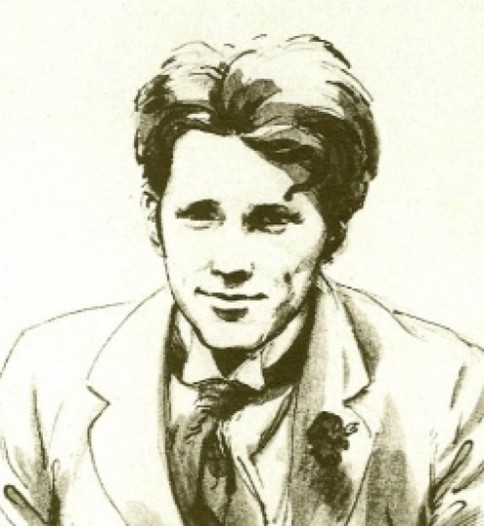
Drawing by Joan Hassall
Everyone who has heard of Rupert Brooke – and even some who have not – can quote at the very least his most famous lines of poetry:
If I should die, think only this of me:
That there’s some corner of a foreign field
That is for ever England.
and:
Stands the Church clock at ten to three?
And is there honey still for tea?
Most people think that Rupert was a golden boy, a romantic war poet and hero. In fact, he was none of these things. So where did these myths come from?
In his lifetime, Rupert was a minor poet with a single volume of poetry to his name. Although he was beginning to make a name for himself, he was relatively little known. After his death on the way to Gallipoli, not in battle but of sepsis from a mosquito bite, he shot to fame like a meteor and his poetry has never been out of print since.
Sexually ambiguous and polymorphously perverse, Rupert was deeply attractive to many men and women. He in his turn was attracted to many people, but incapable of meaningful commitment to any individual. He was in many ways a tragic figure, whose grip on his own sense of identity was poor. There was also a darker side to his character which broke more than one heart.
This book examines the many forces which forged Rupert’s posthumous reputation. Partly he was the author of his own legend, but many others played their part: the church; the government; the military; his old school, Rugby; the arts; the press; his mother, Mary: his close friends; his patron Eddie Marsh; the literary trustees appointed by his mother after her own death, chief among whom was Rupert’s schoolfriend Geoffrey Keynes; and the many biographers and would-be biographers who tried to capture the enigma that was Rupert Brooke. Each of these players had their own vision of Rupert and the many vested interests they represented affected that vision. Finally, the book examines Rupert’s true identity and his place in the pantheon of English poetry.
The book is not yet another biography of Rupert. It is an attempt to strip away the layers of misrepresentation and misconception that have made it so hard to see him as he really was.
In 2021 the book was shortlisted for the Biographers Club’s Tony Lothian Prize for the most promising proposal for a biography.
If you like the sound of the book, and are an agent or a publisher. please get in touch with me via my contact page. (Please note: I am not interested in self-publishing.)
If you just like the sound of it, and would like to know if it gets published, you can do the same, and I will let you know if it succeeds.
